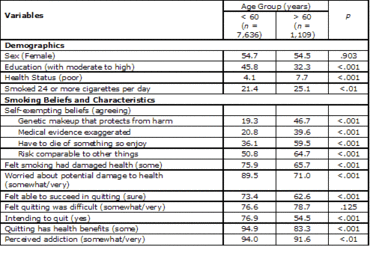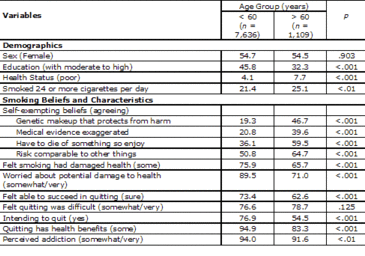In many developed countries worldwide, the average age of the population is increasing; this means that gradually more elderly people will be seeking medical care for a variety of ailments and concerns. Smokers are at risk for a range of health problems, including lung and esophageal cancers; smoking also relates to cancers of the oral cavity, pharynx, larynx, bladder, stomach, cervix, kidney, and pancreas, as well as acute myeloid leukemia (Center for Disease Control, 2004). Increased exposure raises a person’s risk for developing such illnesses, which suggests that such health concerns are especially relevant for aging smokers. For these reasons it is important to find interventions that effectively target this segment of the population. This week’s ASHES summarizes a recent study by Yong, Borland and Siahpush (2005) that investigated the differences between younger and older smokers in four English speaking countries and identified several factors that might make it more difficult for aging smokers to quit.
For this study, the researchers administered by phone the International Tobacco Control Policy Evaluation Survey (ITCPES) to 9,045 adult smokers (aged 18 years or older). The ITCPES questionnaire includes a variety of questions addressing respondents’ beliefs about their vulnerability to consequences of smoking, their ability and motivation to quit smoking, present and future health concerns, and possible health benefits from quitting smoking. Participants were residents of one of four countries: Australia (n = 2,301), Canada (n = 2,206), United Kingdom (n = 2, 400), and United States (n = 2,138). The authors used random digit dialing to select participants. Data reported in this study was collected during November and December of 2002. For the purpose of the study, a “smoker” was defined as someone who had smoked at least 100 cigarettes during their lifetime, and smoked at least one cigarette during the past 30 days. Participants were divided into two groups based on age: younger smokers (n = 7,873), 59 years old or younger and older smokers (n = 1,172), 60 years or older.
Yong et al. compared responses by older smokers to those by younger smokers using chi-square tests. There were significant differences between older and younger smokers for each of the beliefs and characteristics listed in Table 1. Older smokers seemed to be more likely to agree with the self-exempting statements about smoking, were less likely to believe that smoking had a negative impact on their health, and less worried about future health problems related to smoking. Older smokers generally felt less confident in their ability to quit smoking, but were less likely to believe that they were addicted to smoking. Controlling for sex, education, reported health status and country, older smokers were 2.5 times more likely than younger smokers to believe they were genetically protected from the harms of smoking (CI 2.2-2.9); 1.4 times more likely to believe that the medical evidence for the damaging effects of smoking was exaggerated (CI 1.2-1.6); and 0.9 times more likely to believe smoking was no more risky than other behaviors (CI .08-1.2). Yong et al. found that among older smokers a lack of concern for health problems resulting from smoking and perceiving few benefits from quitting, along with enjoying smoking (everyone dies from something, so one might as well enjoy life to the fullest) and low confidence in ability to quit smoking were related to a decreased likelihood that the respondent would want to quit.

Figure. Characteristics of older smokers compared with younger smokers, measured in percent (%) (adapted from Yong et al., 2005)*. Click image to enlarge.
*Due to missing responses, some sample sizes used in these calculations were lower than the total number of participants.
The study found no significant country effect on measures that distinguished younger from older smokers. A notable significant difference between older and younger smokers is that older smokers seemed to rationalize their continued use for a variety of reasons, from believing they would not experience health consequences to believing they would receive no benefits from quitting. These rationalizations suggest a certain level of denial for these older smokers, who seem to prefer to attribute smoking-related symptoms to the aging process rather than smoking. One possible limitation to the study is that we do not know whether the differences in beliefs are particular to older smokers or older people in general.
Nonetheless, these findings have important implications for the treatment of elderly smokers. For interventions to be successful with elderly smokers, the interventions must address certain misconceptions often held by this population segment. The study found that those for whom health benefits were a motivating factor to quit were twice as likely as others to want to quit. As the population of these four countries ages and an increasing number of seniors seek medical care for a variety of ailments, creating effective smoking interventions for this group are of high importance. Though it is too early to tell whether these findings apply internationally, the study shows that addressing these issues and concerns in the elderly population will improve interventions in developed English-speaking countries.
–Siri Odegaard.
References
Center for Disease Control. (2004). The Health Consequences of Smoking: A Report of the Surgeon General, Tobacco Information and Prevention Source (TIPS). http://www.cdc.gov/tobacco/sgr/sgr_2004/Factsheets/2.htm.
Yong, H.-H., Borland, R., & Siahpush, M. (2005). Quitting-related beliefs, intentions, and motivations of older smokers in four countries: Findings from the international tobacco control policy evaluation form. Addictive Behaviors, 30, 777-788.
What do you think? Please use the comment link below to provide feedback on this article.




